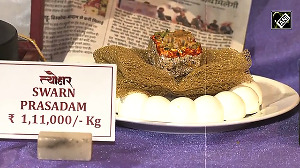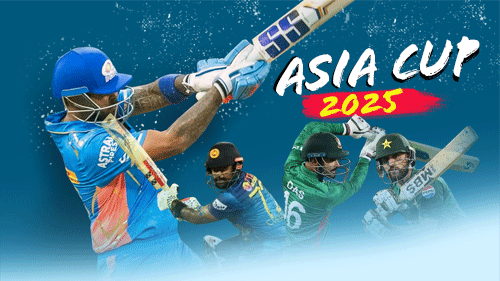From Baranagar to Beijing.
What we are saying here isn't the title of any vernacular cinema. Instead, we are trying our best to describe, in a single phrase, the journey of India's best woman archer; an archer synonymous with achievements over the years.
We jot down a few, strictly for your perusal. A maiden gold medal at the Golden Arrow European Grand Prix in Antalya, Turkey, in 2005 was followed by individual and team golds at the SAF Games in Colombo a year later.
And then came 2007, a landmark year in her career. She first won the individual recurve title in the fourth leg of the Meteksan World Cup in Dover (England) in August. Three months later came the icing on that cake when she won the World Cup final in Dubai (UAE). The latter achievement was the first for an Indian archer.
With the Beijing Olympics round the corner, the country is palpably expecting her bows-and-arrows to secure another medal. She is determined to meet those expectations, and reassures that her quiver still has a lot of arrows that can hit the desired target.
Before leaving for the Chinese capital, Dola Banerjee spared some time for a tête-à-tête with Special Correspondent Bikash Mohapatra and gave matter-of-fact answers on a plethora of issues, save one. Excerpts
To begin with, tell us about your preparations for Beijing?
Preparations are going on well. We all are working very hard and I believe we are headed in the right direction.
It's not that we are doing anything special or different, but it is just that we have speeded up the process.
We have also moved into a bigger range to have a feel of the Games beforehand.
I am personally concentrating on the basics during the practice sessions, trying to improve in the areas which usually cause problems for me in big tournaments and also working on improving the scores.
The last Olympics at Athens were quite a forgettable outing for Indian archers (Interrupts )
The women's team had qualified for the first time in the Olympics at the Athens Games. Considering that very fact I would say we had done quite well.
(India finished eighth in the team competition and Dola was placed 13th in the individual ranking round and 52nd overall)
We lost by the just one point in the quarter-finals and I don't think any country can do so well in their very first attempt at such a big tournament.
If you analyse, you will notice that the general tendency is that a country usually participates in a few Olympics before it starts winning medals.
We played well in three matches but fumbled in the quarters. But it wasn't as bad considering it was our maiden attempt.
The archery team in general and you in particular are being considered medal prospects at Beijing. How much of pressure does the burden of expectations put on the team?
 There's always pressure when there is hope, when a player does well. The biggest reason for this being the fact that India manages, with great difficulty, to win only one medal at the Olympics. And that medal is usually a bronze or silver. So, any athlete who does even remotely better, we peg our hopes on him/her.
There's always pressure when there is hope, when a player does well. The biggest reason for this being the fact that India manages, with great difficulty, to win only one medal at the Olympics. And that medal is usually a bronze or silver. So, any athlete who does even remotely better, we peg our hopes on him/her.
Not only me, but also in the case of others, people feel he/she will go on to win a medal. So, the pressure comes automatically. But you shouldn't feel the pressure much and think only about giving your best.
If you keep thinking about the medal only, then the pressure gets the better of you and you don't even get a good score, let alone win a medal.
Limba Ram was done in by the pressure. (Interrupts )
When Limba Ram was at his peak, I was only a junior.
I mean I had just entered, but all were expecting a lot from Limba as he was doing so well and was in good form.
It is not that we can't win or we don't have the capacity. In fact, we have been winning medals for the last ten years. A few years back we would think if we will manage to qualify for the Olympics, among the 16 teams.
Now we think what medal we can win. So, definitely, we have come a long way forward in archery. We just need to continue the momentum now and thereby, can maintain the results.
What are your personal expectations from the Beijing Games?
It's not that I want only gold and nothing else.
If you look at the Indian medal tally at the Olympic Games over the years, you will realize that India is yet to win a medal in archery. However, in every other archery competition, we have won some medal or the other.
So, whatever medal we win is good, as it will open the medal count in archery. Thus, it is important that Indian archers win a medal, the colour notwithstanding, from the Games.
Thereafter, in future Olympics, we can plan and target which medal we would want to win. As of now we can't expect anything. Whatever comes our way will be good.
And who do you think will be the biggest impediments between you and the medal?
The Koreans are always there. Then there are the hosts, China. Also Italy, Great Britain and Poland have good teams.
It is a knock-out format and will depend a lot on the situation and individual form.
The fact that Reena Kumari wasn't included in the team to Beijing caused a lot of controversy. She has even termed the selection trials as unfair. Do you think she should have made it?
I don't want to be a part of any controversy. (Takes a long pause)
I don't want to say anything on this topic.
Last year was exceptional for you in terms of results. How do you look back at the form then vis-à-vis current form?
This year hasn't been good. So, there's no comparison. Good and bad times do come. I can't do anything about it apart from analyzing where I went wrong and recover from the slump. No sportsman continuously does well. Whatever has happened has happened. The only way is to look forward.
Last year I was in peak form -- in those three or four months. Such kind of form comes after years of practice. I did well in the two World Cups and won individual gold medals.
But, thereafter, my graph has gone down a bit. It is not that I wasn't putting in enough effort; it is just that my form has dipped.
Which of the wins was more special?
Both the wins were equally important in their own ways.
In Dover, I had to win a lot of rounds to secure the gold (beating China's Juan Juan Zhang) whereas in Dubai, it was only between the top four. So you can say we started from the semi-final stage. But you can't compare the two.
On second thoughts, the win over the Korean [(Choi Eun Young), Dola won by a sinle point, 110-109] in Dubai will be a tad better, because the Koreans are rated at the higher level vis-à-vis China.
The general trend is, our athletes (not only the archers) usually do well at the Commonwealth level, even at the World championships. But when it comes to the Olympics, they falter. What do you think is the reason?
If you look at our sporting history, there are no sports where we have continuously won or dominated. Sometimes we do manage to win, but at others we lose.
We are progressing, definitely, but not at the right pace. There is a big gap existing between us and the countries that dominate. We have tried to bridge the gap, and succeeded to a certain extent. But to take ourselves to their level, we take at least four-five more years.
The World Cup is a tournament with a bigger participation, but the Olympics are a tournament with bigger expectation. So the pressure definitely is more.
India is still behind and needs more time to make the adjustment and compete at a global level. The process will take its own time. Nothing is going to happen overnight.
How would you assess the growth of archery as a sport in our country?
Archery has definitely improved a lot over a period of time. Earlier, qualification was our main concern, even in routine tournaments. We failed to qualify in the top 16, even the top 64. But now we are thinking about winning medals -- individual as well as team. The situation has definitely improved in the last five-to-10 years.
Now we have won medals at the team events in the Asian Games, the World Championships et cetera, which was never the case earlier. We have also won individual medals at the World championships and gold at the Asian Championships for the first time in 13 years.
There are also new players coming up on a regular basis and most of them are promising. If this trend continues, the future of archery in our country is definitely bright.
What are the three most important attributes that define a good archer?
Style, form and concentration.
What has been your biggest regret (professionally) so far?
Disappointments, as such, are not many. I have had a good and steady career so far.
But at the Olympic qualifiers last year, my results weren't as good. I was the senior and had more pressure, but as an individual I couldn't perform to my best level.
Thankfully, we didn't have to pay the price for it as our team was quite good. But I definitely felt bad about it.
Despite having participated in two Asian Games, you are yet to win a medal of any colour. Does that also happen to be a regret?
(Dola finished seventh in her maiden Asian Games appearance at Busan, South Korea in 2002. And four years later, she finished fourth at Doha, Qatar)
I was fourth in the Doha Asian Games. I was doing well but had no luck in that tournament. I lost the third-place play-off (for the bronze medal) by just two points.
I was definitely disappointed at missing out on the medal, but there was the satisfaction of having played to the best of my abilities in the whole tournament and had good scores.
Photographs: AFP/Getty Images






